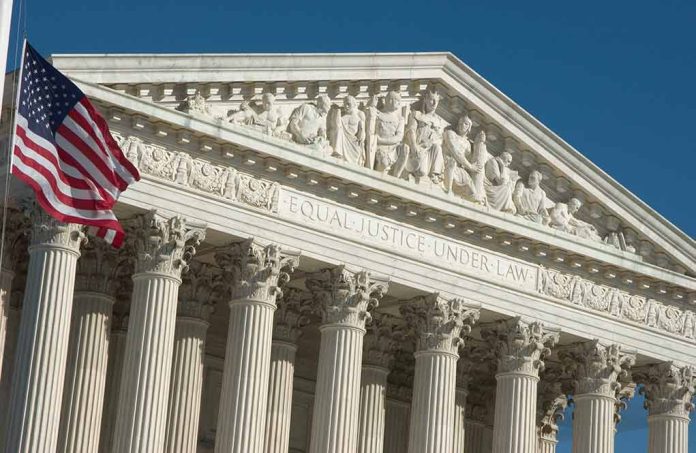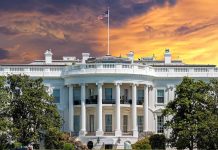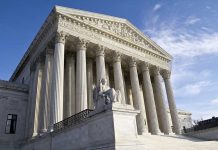
Supreme Court keeps Robert F. Kennedy Jr. on ballot in crucial swing states, potentially impacting Trump’s reelection bid.
At a Glance
- Supreme Court denied Kennedy’s requests to remove his name from Wisconsin and Michigan ballots
- Kennedy endorsed Trump after dropping out of the presidential race
- Kennedy’s presence on swing state ballots could sway voter sentiments
- Trump hinted at a potential health-related role for Kennedy in his administration
- Kennedy’s impact as a potential spoiler in the election remains uncertain
Supreme Court’s Decision Keeps Kennedy on Crucial Ballots
The Supreme Court has made a significant ruling that could reshape the landscape of the upcoming presidential election. Robert F. Kennedy Jr., who recently endorsed Donald Trump after suspending his own campaign, will remain on the ballots in Wisconsin and Michigan despite his efforts to have his name removed. This decision comes as a blow to Kennedy’s strategy to support Trump’s reelection bid by minimizing his own potential to split the vote in key battleground states.
The high court’s ruling, which came without explanation as is typical for emergency decisions, effectively overrides Kennedy’s concerns about inadvertently influencing the election outcome. Justice Neil Gorsuch dissented in the Michigan case, indicating he would have sided with Kennedy’s request. This development adds a layer of complexity to an already intricate political scenario, where every vote in swing states could prove crucial.
Kennedy’s Strategic Ballot Maneuvers
Kennedy’s attempts to remove himself from certain state ballots were part of a calculated move to support Trump’s campaign. He successfully had his name taken off ballots in several other swing states, including Arizona, Nevada, North Carolina, Pennsylvania, Florida, Ohio, and Texas. However, the Supreme Court’s decision means he will remain a ballot option for voters in Wisconsin and Michigan, two states that could play pivotal roles in determining the election’s outcome.
“Our polling consistently showed that by staying on the ballot in the battleground states, I would likely hand the election over to the Democrats, with whom I disagree on the most existential issues.” – Business Insider previously reported Kennedy said at a news conference prior to endorsing Trump
This statement underscores Kennedy’s concern about potentially splitting the vote and inadvertently aiding the Democratic campaign. Despite his efforts to align with Trump, the court’s decision may complicate his strategy to support the former president’s bid for reelection.
Potential Impact on Trump’s Campaign
The implications of Kennedy remaining on these crucial state ballots are significant for Trump’s campaign. While Kennedy has publicly endorsed Trump and urged his supporters not to vote for him, his presence on the ballot could still draw votes away from the former president. This situation highlights the unpredictable nature of third-party candidates in close elections.
“I don’t want you to vote for me,” he said to fans who showed up at a Trump rally in Walker, Mich., in late September, trialing the message that he has pushed for the past month. – Robert F. Kennedy Jr.
Despite Kennedy’s clear message to his supporters, the mere presence of his name on the ballot could influence voter decisions, particularly among those who may not be aware of his endorsement of Trump. This scenario underscores the complexities of ballot access laws and their potential to shape electoral outcomes.
Trump’s Embrace of Kennedy
In an interesting twist to this political saga, Trump has not only welcomed Kennedy’s endorsement but has also hinted at a potential role for him in a future Trump administration. This move appears to be an attempt to capitalize on Kennedy’s appeal to certain voter demographics, particularly those skeptical of establishment health policies.
Trump’s embrace of Kennedy, whom he once labeled a “liberal lunatic,” and suggestion that Kennedy might “go wild on health” in his administration, represents a significant shift in political alliances. This strategic move could potentially broaden Trump’s appeal, but it also risks alienating some of his core supporters who may view Kennedy’s positions on certain issues as too far from traditional conservative stances.
As the election approaches, the impact of Kennedy’s continued presence on these crucial state ballots remains to be seen. What’s clear is that this Supreme Court decision has added another layer of uncertainty to an already unpredictable election season, forcing both campaigns to adapt their strategies in these key battleground states.






















